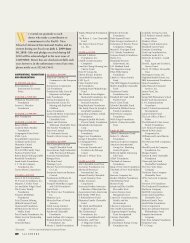Download Current Issue - SAIS
Download Current Issue - SAIS
Download Current Issue - SAIS
You also want an ePaper? Increase the reach of your titles
YUMPU automatically turns print PDFs into web optimized ePapers that Google loves.
While the going is good, it is easy to<br />
envisage the global capitalist model<br />
retaining the upper hand.<br />
Lifting All Boats<br />
Many small countries, particularly in<br />
Central America and the Caribbean<br />
but also in subsistence agriculturedominant<br />
areas in countries as different<br />
as Bolivia, Chile, Colombia, Ecuador,<br />
Mexico, Paraguay and Peru, continue<br />
to suffer in two ways. First, their<br />
chances of selling surplus production<br />
has been undercut by cheaper imports.<br />
Second, because the greatest portion<br />
of their income is devoted to securing<br />
food, the price spikes hurt them<br />
disproportionately compared to the<br />
middle and upper classes. There is no<br />
easy solution. A silver bullet might not<br />
even exist, but we have to keep sharpening<br />
our critical skills to think about<br />
alternatives.<br />
In the Western Hemisphere, multi-<br />
lateral forums that deal with responses<br />
to agricultural price shocks, food<br />
security, food versus fuels, “land grabs”<br />
and displacement, and climate change<br />
and water levels should give priority<br />
to the small Central American and<br />
Caribbean republics. They should also<br />
emphasize the poorest rural sectors in<br />
countries where communities continue<br />
to be displaced by the self-reinforcing<br />
success of economies of scale that are<br />
underpinned by the financing, transport,<br />
storage and distribution clout of<br />
vertically integrated corporations.<br />
“Small is beautiful” may be close to<br />
a contradiction in terms when referring<br />
to capitalist agriculture, but any<br />
perspective that takes the welfare of<br />
all individual human beings seriously<br />
needs to consider the possibility of successful<br />
rural development. Such a perspective<br />
would mean that supertankers<br />
Argentina and Brazil should mind<br />
paddleboats, such as the small Central<br />
American and Caribbean republics<br />
—or, for that matter, the poorest rural<br />
areas in South Asian and Sub-Saharan<br />
countries—as much as they mind other<br />
supertankers, such as Canada, the EU<br />
and the United States.<br />
In turn, these agricultural giants<br />
should also mind and help poor, vulnerable<br />
countries—not through handouts<br />
but through rule changes eliminating<br />
the subsidies and tariffs that<br />
help the supertankers keep growing at<br />
the expense of the small boats.<br />
International relations specialists<br />
will continue to say that such suggestions<br />
are naive to the point of silliness,<br />
but nothing is written in stone when it<br />
comes to the potential for significant<br />
international change. It happens all the<br />
time. n<br />
Francisco E. González is the Riordan<br />
Roett Associate Professor of Latin<br />
American Studies.<br />
2011–2012 31



